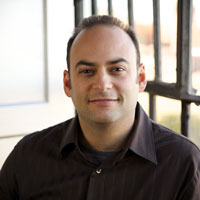Greenberg & Joshi Receive AHW Momentum Grants
August 26, 2024
Drs. Adam Greenberg and Amit Joshi from the Marquette University and Medical College of Wisconsin Joint Department of Biomedical Engineering have each been awarded Momentum grants in the amount of $250,000 from the Advancing a Healthier Wisconsin Endowment for projects addressing pressing health challenges in Wisconsin.
As a competitive funding institution, AHW Momentum grants seek MCW-led collaborative projects that demonstrate a focus on community health, health-focused research, and health workforce development initiatives. With over 40 recipients selected for funding in this grant cycle, the program awarded nearly $10 million dollars in 2024 alone.
Dr. Adam Greenberg, Associate Professor and Associate Dean of Postdoctoral Education, received funding for a project investigating the behavioral and brain-based markers of cognitive decline in childhood cancer survivors. Dr. Amit Joshi, Professor and Vice Chair for Research and Clinical Affairs, has been funded for research investigating light-triggered nanoparticles for targeted drug delivery to malignancies and their respective micro-environments.
 Greenberg to Assess Neurocognitive Decline in Childhood Cancer Survivors
Greenberg to Assess Neurocognitive Decline in Childhood Cancer Survivors
Cognitive decline is a significant complication for individuals who have received chemotherapy and other treatments for cancer. DNA damage, oxidative stress, and inflammation caused by traditional therapies are often accompanied by deficits in cognitive processes including attention, working memory, and processing speed. Smaller studies have suggested this cognitive impairment in pediatric patients with leukemia may be selective to those receiving bone marrow transplant procedures. However, no systematic study has yet taken place.
In the project titled, "Cognitive Dysfunction Related to Pediatric Blood and Marrow Transplantation: Behavior and Neuroimaging," Greenberg and collaborators seek to use behavioral and neuroimaging methods to assess neurocognitive decline in patients who have undergone bone marrow transplant for hematologic malignancies as a child. The study will enroll patients aged eight to 26, selecting individuals who have recently completed treatment (testing both before and after transplant), as well as those who completed treatment three or more years prior to enrollment in the study. This approach will allow the observation of both the immediate and longer-term cognitive impairments observed in these patients. If successful, results will aid in the early detection of relevant abnormalities, lending to earlier intervention and improved treatment outcomes.
Dr. Greenberg is the director of the Sensory Neuroscience, Attention, & Perception Laboratory (SNAP Lab) at MCW. He will be joined in this effort by Drs. Rachel Phelan and Kristin Bingen from the Department of Pediatrics at Children’s Wisconsin.
LEARN MORE ABOUT SNAP LAB
LEARN MORE ABOUT DR. GREENBERG
 Joshi to Develop Light-Triggered Nanoparticles for Cancer Drug Delivery
Joshi to Develop Light-Triggered Nanoparticles for Cancer Drug Delivery
Neurofibromatosis is a rare genetic disorder characterized by malignancies of the nerves, brain, spinal cord, and skin. Peripheral nerve sheath tumors, or tumors growing on the peripheral nervous system, are one of the more serious malignancy types associated with this disease, and the five-year survival rate for affected individuals is reported to be as low as 20%.
Peripheral nerve sheath tumors are distinct in that they are comprised of and surrounded by a large number of macrophages. In normal circumstances, macrophages attack and clear damaged or malignant cells, but in neurofibromatosis associated tumors macrophages are switched to a type that protects the tumor, as opposed to helping destroy it. This is one of the reasons traditional therapies prove so ineffective in treating these tumors, and a lack of financial viability makes projects seeking solutions to this rare but deadly disease unfortunately few and far between.
In the project titled “Photo-Triggered Trojan-Horse Drug Delivery for MPNST Tumor Cell Death and Macrophage Reprogramming,” Dr. Joshi aims to develop light-triggered nanoparticles that deliver multiple drugs to malignant peripheral nerve sheath tumors and associated macrophages, releasing these drugs selectively at the tumor site, reprogramming the immune environment and transforming macrophages from tumor-promoting to tumor-suppressing types. This will enhance tumor destruction and prevent resistance to various potential therapies. The proposed pre-clinical studies will evaluate the feasibility of this dual-targeted chemotherapeutic/immunotherapy approach, with the aim of creating a treatment that is cost-effective, easy to administer, adaptable to other cancers, and capable of improving health outcomes by reducing barriers to care.
Dr. Joshi is the director of the Nanomedicine & Image-Guided Interventions Laboratory (NIGIL) at the Marquette-MCW Joint Department of Biomedical Engineering. He will be joined in this effort by fellow MCW faculty Dr. Daochun Sun, Assistant Professor in the Department of Cell Biology, Neurobiology & Anatomy; Dr. Benjamin Gantner, Assistant Professor in the Department of Endocrinology and Molecular Medicine; and Dr. Donald G. Basel, Section Chief and Professor in the Department of Pediatrics, Division of Genetics.
LEARN MORE ABOUT THE NIGIL
LEARN MORE ABOUT DR. JOSHI
The Joint Department of Biomedical Engineering extends its congratulations to each researcher in recognition of their outstanding contributions to the field of biomedical engineering and continued efforts to advance knowledge in the pursuit of changing life.
Learn more about BME Research

 Greenberg to Assess Neurocognitive Decline in Childhood Cancer Survivors
Greenberg to Assess Neurocognitive Decline in Childhood Cancer Survivors Joshi to Develop Light-Triggered Nanoparticles for Cancer Drug Delivery
Joshi to Develop Light-Triggered Nanoparticles for Cancer Drug Delivery